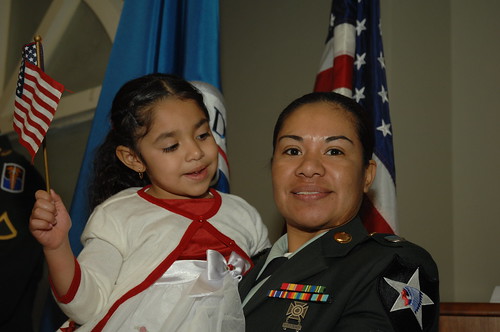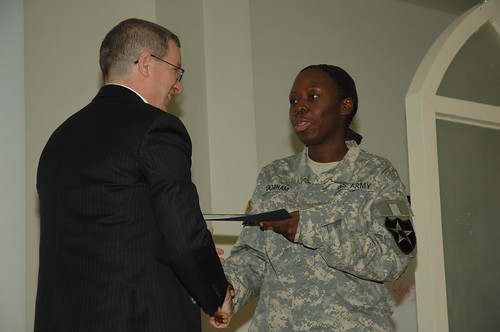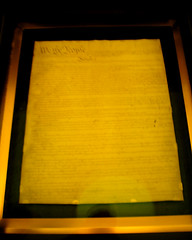Check out these Citizenship and Freedom images:
Military Naturalization Ceremony – Yongsan Korea – 15 December 2008 – USFK – United States Army – USAG-Y

Image by US Army Korea – IMCOM
Army in Korea celebrates newest citizens
“You have moved to several posts waiting for your application [citizenship] to catch up with you—today it caught up.”
— Kenneth J. Sherman, Citizenship and Immigration Services Field Office Director, U.S. Embassy, Seoul
The Army Family in Korea welcomed 43 new American citizens to its ranks during a naturalization ceremony held at United States Army Garrison Yongsan, Seoul, Republic of Korea, Dec. 15. Thirty-seven active-duty Servicemembers and six spouses of active-duty military members were naturalized as American citizens during the ceremony.
Although this was the first time the newly-naturalized citizens swore the Oath of Allegiance, many of the Servicemembers present had already demonstrated their patriotism while serving in Iraq and Afghanistan before becoming U.S. citizens. Staff Sgt. Francis Manalac, originally from the Philippines, said he started the naturalization process while serving in Iraq. “This is a very special ceremony,” he said. “Today is the culmination of a four-year process.” Staff Sgt. Manalac now calls Chicago home.
“All are being naturalized because of their service,” said Kenneth J. Sherman, Citizen and Immigration Services Field Office Director, U.S. Embassy, Seoul. “They are from 20 countries, on five continents with one thing in common—their service and sacrifice. There are people in this audience who have served in Iraq and Afghanistan—willing to give the ultimate sacrifice.”
Sherman also noted that it is not only the Soldiers and Sailors who sacrifice and endure, but military families as well. That is the reasoning behind a new program allowing spouses of active-duty military members to become naturalized while living overseas, he said. On Jan. 28, 2008, President George W. Bush signed a bill, which was passed by Congress, permitting spouses stationed with their sponsor overseas to pursue naturalization.
The candidates hailed from United Kingdom, India, Jamaica, Russia, Ghana and many other nations from throughout the world. “This is not just a list of countries,” Sherman explained. “It’s the history and the future of the United States. The U.S. is built on immigration–it strengthens every aspect America, from our economy to our culture, to expanding our freedoms.”
“All my life all I’ve known is America,” said Private 1st Class Phinnara Pai, 2nd Infantry Division. “Why not become an American citizen?” Pai said he was once a child refugee from Cambodia.
“Many here today appreciate America, our freedoms, our Constitution, in a way people born there perhaps do not,” said Sherman. Private 2nd Class Tanya Erica Gorham, originally from Barbados, expressed similar sentiments about taking the “rough path” to American citizenship. “I’m glad I can go about achieving it this way to appreciate it more,” she said. “I want to instill in my son that it is a privilege to be born in a country so free.”
To learn more about living and serving with the US Army in Korea visit us online at imcom.korea.army.mil
Military Naturalization Ceremony – Yongsan Korea – 15 December 2008 – USFK – United States Army – USAG-Y

Image by US Army Korea – IMCOM
Army in Korea celebrates newest citizens
“You have moved to several posts waiting for your application [citizenship] to catch up with you—today it caught up.”
— Kenneth J. Sherman, Citizenship and Immigration Services Field Office Director, U.S. Embassy, Seoul
The Army Family in Korea welcomed 43 new American citizens to its ranks during a naturalization ceremony held at United States Army Garrison Yongsan, Seoul, Republic of Korea, Dec. 15. Thirty-seven active-duty Servicemembers and six spouses of active-duty military members were naturalized as American citizens during the ceremony.
Although this was the first time the newly-naturalized citizens swore the Oath of Allegiance, many of the Servicemembers present had already demonstrated their patriotism while serving in Iraq and Afghanistan before becoming U.S. citizens. Staff Sgt. Francis Manalac, originally from the Philippines, said he started the naturalization process while serving in Iraq. “This is a very special ceremony,” he said. “Today is the culmination of a four-year process.” Staff Sgt. Manalac now calls Chicago home.
“All are being naturalized because of their service,” said Kenneth J. Sherman, Citizen and Immigration Services Field Office Director, U.S. Embassy, Seoul. “They are from 20 countries, on five continents with one thing in common—their service and sacrifice. There are people in this audience who have served in Iraq and Afghanistan—willing to give the ultimate sacrifice.”
Sherman also noted that it is not only the Soldiers and Sailors who sacrifice and endure, but military families as well. That is the reasoning behind a new program allowing spouses of active-duty military members to become naturalized while living overseas, he said. On Jan. 28, 2008, President George W. Bush signed a bill, which was passed by Congress, permitting spouses stationed with their sponsor overseas to pursue naturalization.
The candidates hailed from United Kingdom, India, Jamaica, Russia, Ghana and many other nations from throughout the world. “This is not just a list of countries,” Sherman explained. “It’s the history and the future of the United States. The U.S. is built on immigration–it strengthens every aspect America, from our economy to our culture, to expanding our freedoms.”
“All my life all I’ve known is America,” said Private 1st Class Phinnara Pai, 2nd Infantry Division. “Why not become an American citizen?” Pai said he was once a child refugee from Cambodia.
“Many here today appreciate America, our freedoms, our Constitution, in a way people born there perhaps do not,” said Sherman. Private 2nd Class Tanya Erica Gorham, originally from Barbados, expressed similar sentiments about taking the “rough path” to American citizenship. “I’m glad I can go about achieving it this way to appreciate it more,” she said. “I want to instill in my son that it is a privilege to be born in a country so free.”
To learn more about living and serving with the US Army in Korea visit us online at imcom.korea.army.mil
Military Naturalization Ceremony – Yongsan Korea – 15 December 2008 – USFK – United States Army – USAG-Y

Image by US Army Korea – IMCOM
Army in Korea celebrates newest citizens
“You have moved to several posts waiting for your application [citizenship] to catch up with you—today it caught up.”
— Kenneth J. Sherman, Citizenship and Immigration Services Field Office Director, U.S. Embassy, Seoul
The Army Family in Korea welcomed 43 new American citizens to its ranks during a naturalization ceremony held at United States Army Garrison Yongsan, Seoul, Republic of Korea, Dec. 15. Thirty-seven active-duty Servicemembers and six spouses of active-duty military members were naturalized as American citizens during the ceremony.
Although this was the first time the newly-naturalized citizens swore the Oath of Allegiance, many of the Servicemembers present had already demonstrated their patriotism while serving in Iraq and Afghanistan before becoming U.S. citizens. Staff Sgt. Francis Manalac, originally from the Philippines, said he started the naturalization process while serving in Iraq. “This is a very special ceremony,” he said. “Today is the culmination of a four-year process.” Staff Sgt. Manalac now calls Chicago home.
“All are being naturalized because of their service,” said Kenneth J. Sherman, Citizen and Immigration Services Field Office Director, U.S. Embassy, Seoul. “They are from 20 countries, on five continents with one thing in common—their service and sacrifice. There are people in this audience who have served in Iraq and Afghanistan—willing to give the ultimate sacrifice.”
Sherman also noted that it is not only the Soldiers and Sailors who sacrifice and endure, but military families as well. That is the reasoning behind a new program allowing spouses of active-duty military members to become naturalized while living overseas, he said. On Jan. 28, 2008, President George W. Bush signed a bill, which was passed by Congress, permitting spouses stationed with their sponsor overseas to pursue naturalization.
The candidates hailed from United Kingdom, India, Jamaica, Russia, Ghana and many other nations from throughout the world. “This is not just a list of countries,” Sherman explained. “It’s the history and the future of the United States. The U.S. is built on immigration–it strengthens every aspect America, from our economy to our culture, to expanding our freedoms.”
“All my life all I’ve known is America,” said Private 1st Class Phinnara Pai, 2nd Infantry Division. “Why not become an American citizen?” Pai said he was once a child refugee from Cambodia.
“Many here today appreciate America, our freedoms, our Constitution, in a way people born there perhaps do not,” said Sherman. Private 2nd Class Tanya Erica Gorham, originally from Barbados, expressed similar sentiments about taking the “rough path” to American citizenship. “I’m glad I can go about achieving it this way to appreciate it more,” she said. “I want to instill in my son that it is a privilege to be born in a country so free.”
To learn more about living and serving with the US Army in Korea visit us online at imcom.korea.army.mil










